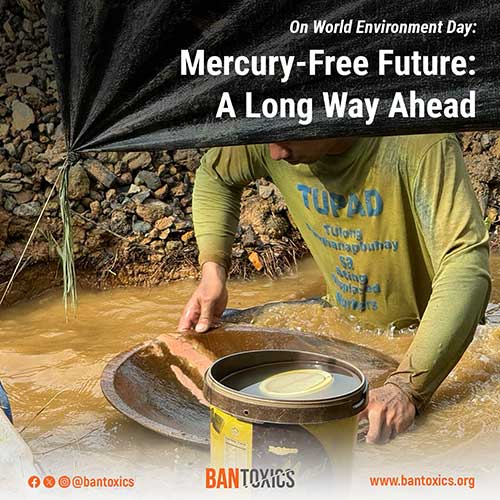
As the nation marked World Environment Day, BAN Toxics, an environmental watchdog group, highlighted the persistent exposure of Filipinos and the environment to toxic mercury.
Mercury is a neurotoxin that poses significant health risks, accumulating in ecosystems and human bodies due to its indestructibility.
“While the Philippines has made significant progress in strengthening regulations to reduce mercury usage to protect vulnerable populations, disadvantaged groups, and the environment from toxic effects, the work is far from over,” said Jam Lorenzo, Policy Development and Research Officer of BAN Toxics.
“We continue to face the illegal trade of mercury used in artisanal and small-scale gold mining and the illegal sale of mercury-added skin-lightening products, mercury capsules for dental amalgam, and mercury-containing medical measuring devices in stores and e-commerce platforms.”
Artisanal small-scale gold mining remains a sector struggling with formalization. For example, one mining association in Camarines Norte has been processing its permit for the declaration of Minahang Bayan and a small-scale mining contract since 2014, spending over 5 million pesos without completion.
The demand for mercury has surged alongside record gold prices, compelling small-scale miners to risk their health by using mercury, sold in pet bottles for as much as 8,000 pesos per kilo.
Market monitoring by BAN Toxics revealed the sale of mercury-laced beauty creams in public markets and urban commercial establishments.
Recent visits to Tacloban City, Tuguegarao, Daet, and Metro Manila exposed the availability of FDA-banned Goree skin-whitening creams containing high mercury levels. Additionally, unnotified and banned skin-whitening creams proliferate on e-commerce platforms, with over 1,000 sellers identified to date.
“Mercury-added skin lightening products and mercury dental amalgam capsules continue to be available in both offline and online markets due to illegal transboundary trade and domestic sales. This persists despite global and regional regulations, fueled by limited law enforcement resources, consumer demand for cheaper options, and corruption,” Lorenzo explained.
The group has documented sellers of mercury dental amalgam in dental supply stores in Manila and monitored over 35 sellers on Lazada, Shopee, and Facebook Marketplace.
Although mercury-containing medical devices are largely discontinued in healthcare facilities, improper mercury waste management remains a challenge.
The Philippine Healthcare and Mercury Waste Management project, led by UNIDO in partnership with the DENR-Environmental Management Bureau and BAN Toxics, aims to address this issue over the next five years.
BAN Toxics called on the government to engage local communities in crafting the National Action Plan for artisanal and small-scale gold mining. They urged regulatory bodies to develop sustainable solutions to reduce mercury use and safeguard traditional livelihoods.
“Preventing the production, trade, advertising, and sale of mercury-added products requires a multifaceted strategy, including robust regulations, enforcement policies, and regional cooperation,” BAN Toxics emphasized.
“We reiterate our call on the government to improve our regulatory agencies’ capacity for market surveillance, enforcement, product inspection, and analysis to effectively curb the widespread trade of products containing toxic chemicals.”
The Minamata Convention on Mercury, which the Philippines ratified in 2017, celebrates its seventh anniversary this year.





















